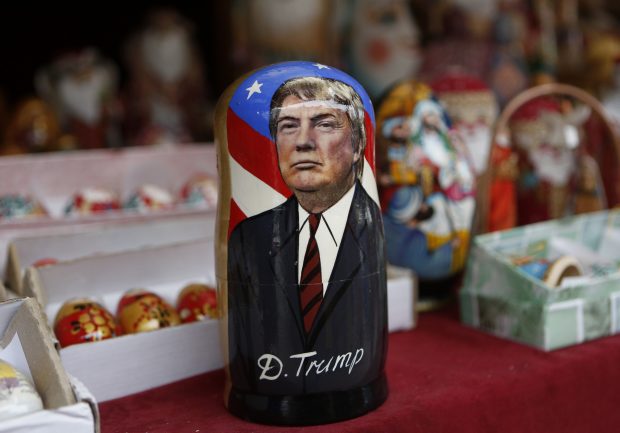The Trump Administration: The Outlook For U.S. Foreign Policy

A traditional wooden Matryoshka doll depicting President-elect Donald Trump is displayed at a shop in Kiev, Ukraine, Wednesday, Nov. 9, 2016. Donald Trump claimed his place Wednesday as America’s 45th president. (AP Photo/Sergei Chuzavkov)
Richard Giragosian – Director, Regional Studies Center (RSC)
For many Americans, and especially for supporters of Democratic candidate Hillary Clinton, the victory of Donald Trump as the country’s next president was a serious surprise. For many others, and most notably for his vehemently loyal backers, the victory was a refreshing renewal of their hopes for a new kind of America. Looking beyond the reaction, however, this was one of the most contested and crucial U.S. presidential elections in decades, marked by a pronounced polarization that will be a difficult and daunting challenge to overcome.
Yet as surprising the Trump election may seem for the American public, the implications of a substantially new U.S. foreign policy under a Trump Administration has already sparked serious concerns in many countries. In this context, this election, in particular, stands out, not only for its divisive nature but by virtue of its decisive significance, with sweeping implications for a wide range of regions and countries. It also comes at a crucial time, marked by an urgency of leadership and driven by a set of unprecedented crises and challenges, each of which will challenge an untested new American Administration.
Assessing the outlook for such looming changes in U.S. foreign policy, there are several key points that defined the likely Trump worldview, with an apparently direct impact on several strategic regions of the world. The first of these Trump foreign policy preferences concerns his view of Russia, and its leader President Vladimir Putin. As his campaign promises to reveal, Trump will likely seek to ease if not lift U.S. sanctions on Russia, forging a new policy based not on contentious containment but rather, modeled on concerted consideration of Moscow.
In practical terms, this will grant Putin a virtual free hand to both consolidate and even extend Russian power and influence over many of its neighbors. This will also, as Trump has stated, not only accept the Russian annexation of Crimea but will also undermine Western commitment and resolve in supporting Ukraine and Georgia. Extending further, such a reversal of U.S. policy toward Putin will also weaken security in Central and Eastern Europe, thereby only further endangering the Baltic states. And in another related impact, both the NATO alliance and the European Union would be challenged by an abrupt vacuum of engaged leadership, leaving each stranded in assuming the mantle of Western security.
For the South Caucasus, such a new U.S. accommodation of Russia will inherently endanger the region by a new period of U.S. benign neglect, marking the region as a strategic afterthought at best. And for the region’s frozen conflicts, it seems likely that Trump’s narrower definition of American national interests will seriously degrade any U.S. involvement or engagement.
A second, near certain policy shift centers on the U.S. strategic approach toward Asia. Clearly, the early tenure of a new Trump Administration will be distracted by a domestic agenda driven by a desire to undo and overturn much of the Obama legacy, from health care to tax policy. But in foreign policy, a likely scenario involves both a reversal of the “pivot to Asia” policy objective of the Obama Administration and, more destabilizing, a possible trade war with China, rooted in a new round of American protectionist trade policies. For Asian markets, and especially for Korea and Japan, such a scenario would pose a reckless risk.
Yet we may be surprised and even reassured by the resiliency of the American model of governance, which stems from the reliability of institutional stability over the threat of reckless individual “statesmanship.” Such optimism is rooted in the reality of the limits of the presidency, where the checks and balances of the system will impose real limits on any imperial presidency. And in foreign policy, the Congress is key, especially given the paradox of a Republican-controlled Congress that differs and diverges from President Trump and which may actually challenge the risk from such reckless reversals in the fundamental tenets and strategic drivers of U.S. foreign policy.
*The author is the Director of the Regional Studies Center (RSC), an independent “think tank” in Yerevan, Armenia.
























































